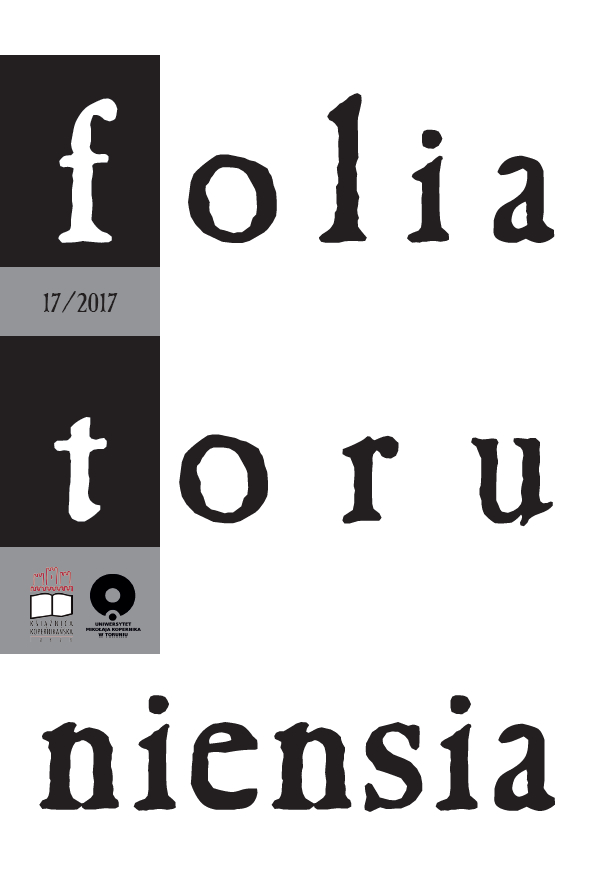Polish books (collections) in the libraries of Rome
DOI:
https://doi.org/10.12775/FT.2017.002Keywords
Polish collections of writings in Rome, Polonica, libraries of RomeAbstract
The Polish-Italian contacts have a long history. From the very Middle Ages, when Polish scholars started to study in Italian universities, they centered around science and education. In the subsequent ages the mutual contacts also included the artistic field, when Polish artists used to go to Italy to master their skills with the best teachers. From the end of the 18th century to the mid-20th century the cooperation also included the military, social-political and economic aspects. In Italy Poles took part in the struggle for independence leading to the Union of Italy ( the Risorgimiento period), and later in the fights during both world wars. Since the mid-20th century Italy and Poland have maintained bilateral contacts in various fields.
In all those periods the Polish presence in Italy was recorded in written, iconographic and artistic sources. Most of them are preserved in archives and libraries in Rome – the centre of European science, culture and Christianity. It was not until the 20th century, when the first scientific Polish institutions were set up in Rome, that it became possible to register, compile and sort out Polonicas found in Rome’s libraries, archives, cultural institutions, and private collections. Written monuments indicate a number of associations both in the sacrum and profanum spheres. The common heritage of historical memory is the evidence of Poland’s belonging to the European community for a long time.
References
Barycz, Henryk. 1938. Polacy na studiach w Rzymie w epoce Odrodzenia (1440–1600). Kraków: Nakładem Polskiej Akademii Umiejętności.
Bersohn, Mathias. 1890. Studenci Polacy na Uniwersytecie Bolońskim w XVI i XVII wieku. Kraków: W. Drukarni Czasu Fr. Kluczyckiego i Sp.
Biliński, Bronisław. 1977. Biblioteca e Centro di Studi a Roma dell’Accademia Polacca delle Scienze nel 50 anniversario della fondazione 1927–1977.
Wrocław: Zakład Narodowy im. Ossolińskich – Wydaw. Polskiej Akademii Nauk.
Biliński, Bronisław. 1979. “Prolegomena al dialogo culturale e scientifico italo-polacco”. W Polonia–Italia. Relazioni artistiche dal Medioevo al XVIII secolo. Atti del convegno tenutosi a Roma, 21–22 maggio 1975, 7–20. Wrocław: Zakład Narodowy im. Ossolińskich.
Bladowska, Agnieszka. 2008. „Polskie książki w bibliotece miejskiej w Ostii pod Rzymem”. Nasz Świat, Marzec.
Chrzanowski, Tadeusz, Marian Kornecki. 1994. Polskie pomniki w świątyniach Rzymu. Warszawa: Instytut Sztuki PAN, Fundacja Rzymska im. J. S. Umiastowskiej.
Dopierała, Kazimierz, Hieronim Fokciński, red. 2002. Polonia włoska. Słownik Polaków i instytucji polskich we Włoszech. t. 1. Bydgoszcz: Wydawnictwo Akademii Bydgoskiej im. Kazimierza Wielkiego.
Estreicher Stanisław. 1938. Bibliografia Polska. t. 32. Kraków: Czcionkami Drukarni Uniwersytetu Jagiellońskiego pod zarządem Józefa Filipowskiego.
Fijałek, Jan. 1900. Polonia apud Italos scholastica saeculum XV, Fasc. 1. Kraków: Typis et sumptibus Universitatis Jagellonicae.
Henczel-Wróblewska, Ligia. 2006. Dzieje Polaków we Włoszech. Kalisz–Poznań: Wydział Pedagogiczno-Artystyczny UAM.
Kwiatkowska, Maria Irena. 1999. Groby polskie na cmentarzach Rzymu. Warszawa: Instytut Sztuki PAN, Fundacja Rzymska im. J. S. Umiastowskiej.
Morawski, Kazimierz. 1924. Rzym i narody. Kraków: Nakład Gebethnera i Wolffa.
Pasierb, Janusz St. Janocha, Michał. 1999. Polonica artystyczne w zbiorach watykańskich. Warszawa: Wydawnictwo Krupski i S-ka.
Prządka, Ewa, red. 2000–2014. Świadectwa–Testimonianze. t. 1–7. Rzym: Fondazione Romana Marchesa J. S. Umiastowska.
Sienkiewicz, Henryk. 2014. Na jasnym brzegu. https://wolnelektury.pl/media/book/pdf/na-jasnym-brzegu.pdf.
Downloads
Published
How to Cite
Issue
Section
License
Authors sign the license agreement, where authors have copyright but license exclusive rights in their article to the publisher. In this case authors have a range of rights, including:
- The right to share or reuse their article in the same ways permitted to third parties under the Creative Commons Attribution-NoDerivatives 4.0 (CC BY-ND 4.0) license. Following it, the author can "copy and redistribute the material in any medium or format for any purpose, even commercially. The licensor cannot revoke these freedoms as long as you follow the license terms."
- Authors retain patent, trademark and other intellectual property rights (including research data).
- Authors receive proper attribution and credit for the published work.
![]()
Stats
Number of views and downloads: 519
Number of citations: 0



